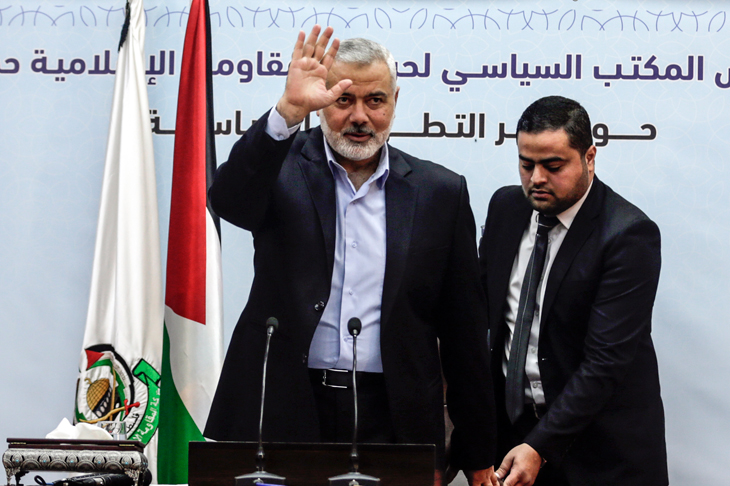In the seventy years since the rebirth of the Jewish state, the relocation of the US embassy to Jerusalem is one of the more momentous, yet contentious events in the country’s short history. Amid celebrations in the Holy City on the opening day, Tuesday, May 15, tens of thousands of Palestinians protested at the Gaza border fence, an hour or so drive away. Up to sixty were killed, fifty of whom Hamas say were their militants. Hamas demands a full ‘right of return’: a migration of up to five million Palestinians back to their homes in what is now, and has been for the past seventy years, Israel. The events of that day were an attempt to vindicate this dream; the goal being to create a callous juxtaposition between smiles in Jerusalem and dead Palestinians in Gaza – a scene for which many news outlets, some with a perfect-to-script split screen visual, aired.
The international outcry was strong – Theresa May declared Britain’s support for an independent investigation into Israel’s use of force. Israeli Prime Minister Benjamin Netanyahu maintained his country’s right to sovereignty and self-defence.
But what is a tiny country, just one sixth of one per cent of Arab lands, to do? Accepting anything less than a complete cessation to violations of the security fence would put Israeli lives at risk, particularly those who live some hundreds of metres away from the Gaza perimeter.
If the Israeli Defense Force had not acted with the resolve it demonstrated that day, it is not unimaginable to believe that Hamas would have rallied tens of thousands more people to the security fence in an attempt to humanly saturate the territories beyond. A humanitarian catastrophe would be guaranteed if such a situation were to arise, creating a casualty list far exceeding the numbers totalled over the past six weeks.
Do those deriding Israel really expect it not to maintain the integrity of the security fence and protect its citizens, at all costs, just like any other state would if faced with similar circumstances?
Given everything we know about Hamas – the terror tunnels, the primary school plays that feature first-graders simulating the murder and kidnap of Jews, the public executions of ‘collaborators’, the human-shield headquarters under Dar Al Shifa Hospital, the declaration in their Charter to murder Jews – it seems only sensible for Israel to reserve the right to use lethal force against any attempted breach of its security fence. For Hamas, May 15 was the climax of the Great March of Return, and, as desired, their victimology was validated by much of the Western press.
Under the predictable dynamics of contemporary politics, Hamas knows it cannot lose. In the best case, a number of young Palestinian men slice their way through the security fence, brandishing meat cleavers, grenades and other such weapons synonymous with peaceful protests, and reach an Israeli kibbutz to slaughter as many innocent civilians as possible. These martyrs will be lionised back in Gaza, their hero status enlarged with every Jew they kill, securing lucrative endorsements for their grieving families and electrifying the jihadi spirit ready for the next batch of young men to die a righteous death for Palestine.
Alternatively, dozens of Palestinians are killed cutting their way through the security fence, flying fire bomb-ladened kites or sling-shotting rocks at soldiers, all to the horror of international onlookers. Israel is denounced as a despicable regime, colonial in birth with a habitual interest in child-killing, the Palestinians are elevated as morally righteous victims, and Hamas accrues more sympathy on the front pages of Western newspapers. How one stumbles through this moral trapdoor is clear, but such impulsive compassion does nothing to alleviate the plight of Palestinians in Gaza.
Disquietingly, there seems to be a profound hunger amongst distant, liberal Western observers for Israeli cruelty and Palestinian suffering. No more at home do these people seem when hurling abuse at Israel. The selectivity of their outrage is astonishing – Israel’s military conduct is held to such a uniquely high standard vis-à-vis other countries that their prejudice is laid bare, naked in all its dogmatic glory. Anti-Israelism validates their place in the world as resisters of oppression and protectors of the down-trodden – a matter of therapeutic and moral posturing, rather than genuine justice and endeavour to resolve the conflict. The deep problem with this, aside from its shallow sincerity and tremendous narcissism, is that it feeds Hamas’ victim narrative and reinforces their much-sought-after claim to moral ascendancy. This debate need not be a binary one: criticise Israeli military conduct, be troubled by the dire realities of life in Gaza, but lay the blame squarely where it belongs – on Hamas.
Perhaps the IDF did use uniquely penetrative bullets incongruous with the sole objective of neutralising the enemy. Maybe there were occasions when the IDF could have dispersed the crowd by other, non-lethal, means. These are questions that should be asked, and answers demanded. But those so intent on acquiring such answers should apply the same rigorous standard of scrutiny to Hamas – its tactics, motives and objectives.
Alas, ascertaining this equilibrium is far too uncommon. Perhaps because those decriers of Israel know that if they dig a little deeper into the cesspit of Hamas dogma, they will find a grim place considered by modern history to be the grimmest of all. The renunciation of Hamas should be a baseline assumption in this debate, but for many, it’s just too tempting to fight power and defend the powerless from the cosy television studios of the West.
A clear position must be maintained on this matter – Hamas is no friend of the Palestinians. It is an anti-Semitic regime, cut from the same cloth as Isis, Boko Haram and al-Qa’eda, that seeks theocratic rule over Israel and the West Bank. Roused by nasty fumigations from Teheran, it not only denies the Holocaust but gives every reason to believe it will commit another one if given the chance.
The Israel-Palestine conflict is as dense and complex a subject as any geopolitical issue, and peaceful resolutions prove difficult to come by in this part of the world. Only when it is a given, in this debate, that the bane of evil rests in the underground hideouts of Gaza and not the streets of Jerusalem, will progress for all parties, particularly the Palestinians, be possible.
Got something to add? Join the discussion and comment below.
Get 10 issues for just $10
Subscribe to The Spectator Australia today for the next 10 magazine issues, plus full online access, for just $10.
You might disagree with half of it, but you’ll enjoy reading all of it. Try your first month for free, then just $2 a week for the remainder of your first year.














Comments
Don't miss out
Join the conversation with other Spectator Australia readers. Subscribe to leave a comment.
SUBSCRIBEAlready a subscriber? Log in